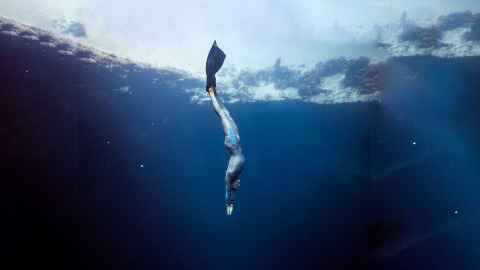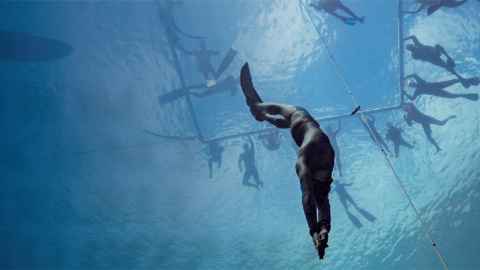From Science degree to deep sea
01 November 2018
A Q&A with alumnus William Trubridge, first man in the world to freedive to a depth of more than 100 metres.

In 2001 William Trubridge graduated with a Bachelor of Science from the University of Auckland. He then worked for just one year in genetic science before taking his life in a totally new direction. By 2007 William had achieved his first world record in freediving, and four years later became the first man in the world to freedive to a depth of more than 100 metres. Through the years William has made headlines all around the world. Here he tells a little about his life, in his own words.
I’m based in the Bahamas, where I train and attempt world records in freediving in a natural cenote [reservoir of water] called ‘Dean’s Blue Hole’. It is a 200-metre-deep shaft in the corner of a lagoon, which protects it from waves and current, making it ideal for my sport.
“I’ve been a freediver now for 15 years, and specialise in the purest discipline of unassisted (no fins) freediving, which I see as a measure of pure human aquatic potential.”
What are the best things about living there, and about what you’re doing?
“Long Island is an ‘out island’ of the Bahamas, which means it doesn't get as much tourism, and is mostly just local families of fishermen. So the life here is very peaceful and the seas are abundant with seafood, although we are starting to see the effects of overfishing and plastic pollution even here.
“It's a long way to come home to New Zealand, which means I only get back about once a year, but unfortunately there’s nowhere in Aotearoa where I could train efficiently at depth as I do in the Bahamas.
“For me freediving is the most rewarding activity. It allows me to spend my time underwater, where the flora and fauna, as well as all sensations, are completely different to terrestrial life.
As well as this, I experience freediving as a holistic sport that challenges me both physically and mentally. It’s also opened doors for me into researching and exploring nutrition, meditation, yogic breathing techniques and the nature of consciousness.

How has your study at Auckland contributed to what you’re doing now?
“Freediving is easily the most divergent of all sports: it is the only one that takes place in full liquid immersion and the only one that involves long breath holds. As such, the physiology of the sport is unlike any other: splenic contraction, bradycardia, peripheral vasoconstriction and pulmonary haemocompensation are just a few of the many physiological processes that in sports are unique to freediving.
“Given that there has been comparatively little research into these processes and how to maximise them through training and preparation, it means that we freedivers have to also be scientists with our own bodies: observing the effects of different training methods, techniques, diets etc. So my degree at the University of Auckland, although it only led to one year working as a geneticist, has still proven invaluable at preparing me for the kind of challenges I would face when I began my career as a freediver.”
If you would like to learn more about William’s life and achievements, read his autobiography, Oxygen, published by Harper Collins Publishers in New Zealand in 2017, or watch the full-length documentary, Breathe, from ESPN producer Martin Khodabakhshian.
Ingenio: Spring 2018
This article appears in the Spring 2018 edition of Ingenio, the print magazine for alumni and friends of the University of Auckland.